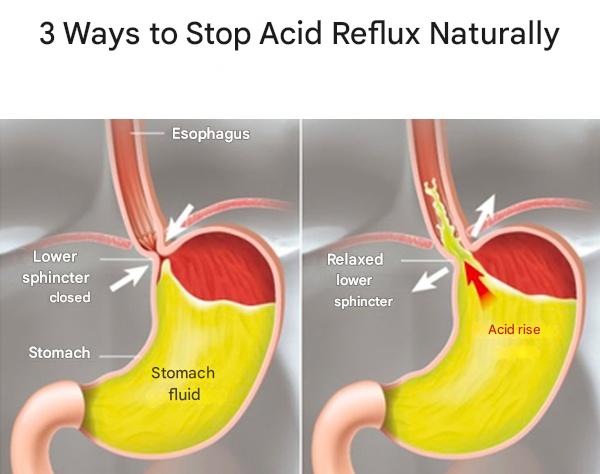Stomach acid signals the pyloric sphincter, located at the bottom of the stomach, to open and empty the mixture of food, hydrochloric acid, and enzymes (called chyme) into the small intestine when it reaches the correct pH.
If you have low stomach acid, the chyme will not be properly broken down, creating an environment conducive to bacterial growth. These bacteria consume the carbohydrates fermenting in the stomach, leading to bacterial overgrowth and poorly digested food, which creates excessive pressure in the stomach.
When the pressure in the stomach becomes too high but the pH is not acidic enough for the pyloric sphincter to open, the only way for the body to relieve this pressure is to open the LES. The released pressure in the esophagus causes the symptoms of heartburn and acid reflux, often misdiagnosed as high stomach acid.
Even if you have little stomach acid, any amount of acid backing up from your stomach into your esophagus will cause discomfort or pain because your esophagus is not designed to handle stomach acid. When this happens regularly, the LES weakens and becomes “leaky,” exacerbating the problem. Low stomach acid leads to inflammation in the gut and throughout the body. Chronic inflammation damages your small intestine, making it difficult to digest and absorb nutrients, increasing your food intolerances, triggering small intestinal bacterial overgrowth (SIBO), and causing leaky gut syndrome.
What Causes Low Stomach Acid?
A variety of factors can lead to low stomach acid. These include aging, poor diet, chronic stress, chronic inflammation, medications such as antacids and proton pump inhibitors (PPIs), and nutrient deficiencies necessary for stomach acid production. Another cause of low stomach acid is untreated hypothyroidism. Thyroid hormone is needed to produce stomach acid. An H. pylori infection (a bacterial stomach infection) can also make it harder for your stomach to produce acid, leading to poor absorption of iron and vitamin B12 and potentially causing SIBO.
The Three Steps to Increase Stomach Acidity and Stop Acid Reflux
1. Take Betaine Hydrochloride or Betaine HCL
The first thing you can do to naturally increase your stomach acid is to take betaine hydrochloride or betaine HCL. Betaine is a compound found in foods, such as grains or beets. Betaine HCL is an acidic form of betaine that works similarly to hydrochloric acid in your stomach. Before taking HCL supplements, take two tablespoons of apple cider vinegar (ACV) to test if your stomach lining is ready. ACV helps stimulate stomach acid production.
